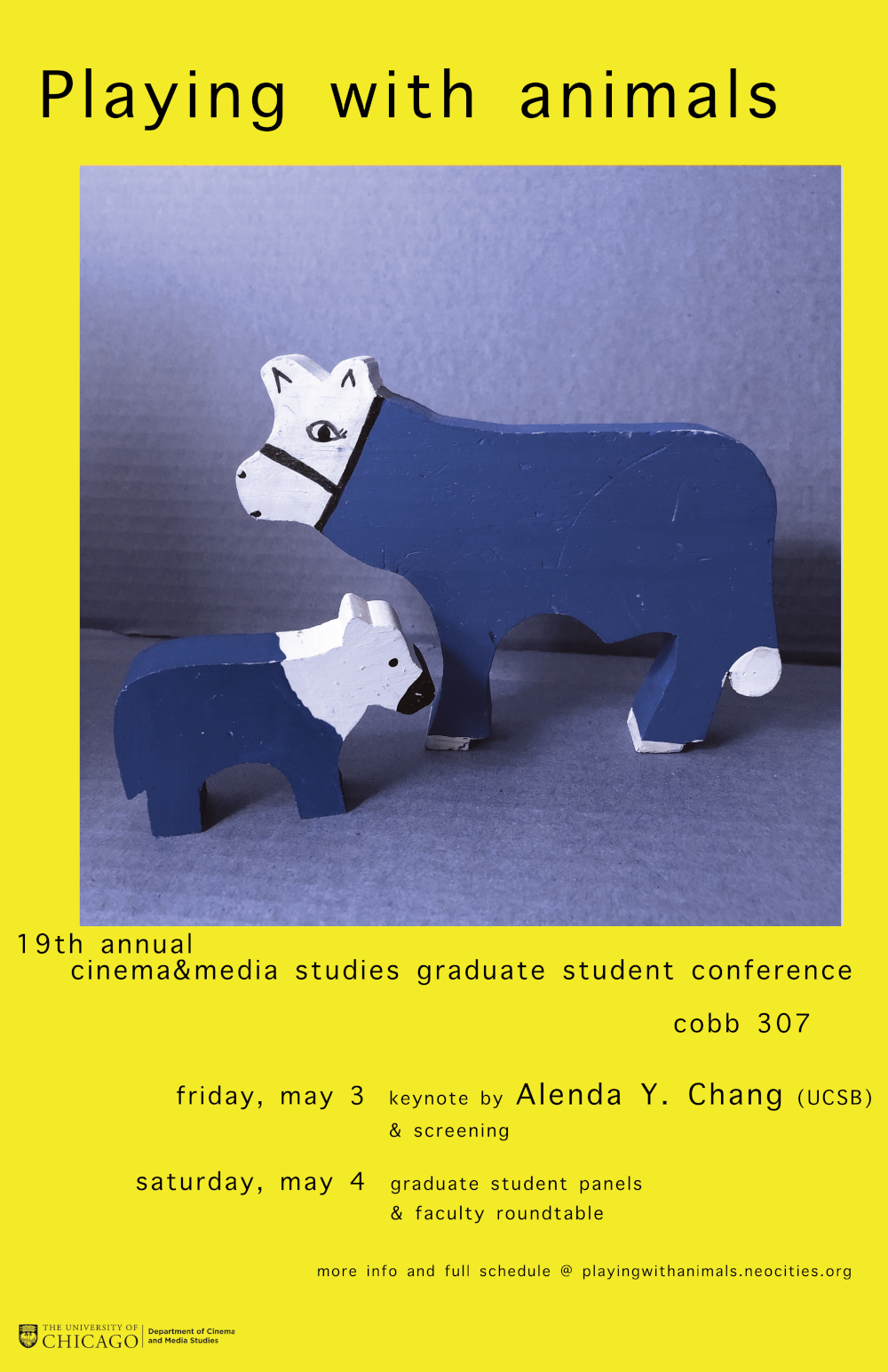The 19th Annual Graduate Student Conference
Department of Cinema and Media Studies, University of Chicago
May 3-4, 2024, Cobb 307
playing.animals.conf@gmail.com
Full Schedule to be Announced

Friday, May 3
Opening Remarks 3:30pm - Cobb 307
Keynote Address 4:00pm - Cobb 307
Alenda Y. Chang (University of California, Santa Barbara)
Opening Reception Dinner 5:30pm - Cobb 310/311
Screening 7:00pm - Cobb 307
Dog Baseball (1986, William Wegman)
Popcorn (1931, Frank Moser & Paul Terry)
The First Cat Obstacle Course, New Jersey (2005, Trevor Shimizu)
Mechanical Cow (1937, Jack Zander & Paul Terry)
Blinky (1988, Bruce and Norman Yonemoto & Jeffrey Vallance)
The Big Dog House (1930, Zion Myers & Jules White)
Out of the Melting Pot (1927)
The Boy Who Liked Deer (1975, Barbara Loden)
(79 minutes, 16mm and digital video)
Saturday, May 4
Breakfast 9:00am - Cobb 310/311
Panel I 9:30am - Cobb 307
Panel II 11:00am - Cobb 307
Lunch 12:30pm - Cobb 310/311
Panel III 1:30pm - Cobb 307
Panel IV 3:00pm - Cobb 307
Closing Roundtable 5:00pm - Cobb 307
Closing Dinner 6:00pm - Cobb 310/311
Call for Papers:
“When I play with my cat, how do I know that she is not passing time with me rather than I with her? We entertain ourselves with mutual monkey-tricks. If I have times when I want to begin or to say no, so does she.” – Montaigne, Apology for Raymond Sebond (1576)
Humans live in a world full of beings other than themselves. Among these, animals serve an outsized role. Of the many ways that humans and animals interact, play is an exceedingly common but surprisingly fraught form. This conference looks to ask: how do we relate to animals through play? How might we play with the division between the human and non-human? How do we recognize play within and across species, and how does it become significant?
A motivating concern of this conference is how playful animal-human relationships structure media, and vice versa. Across history, animals animate and enliven media. From cave paintings to illuminated manuscripts, to the animal photography of Muybridge and Marey, and on through video games like Donkey Kong and Animal Crossing, animal play is often core to the demonstration and exploration of new technical capacities. These media, in turn, stage continual reassessments of the status of animals in our lives. How, for instance, do viral videos, memes, and avatars change the meaning of relating to animals playfully?
Animal play is also foundational to game and play studies. It is no coincidence that Huizinga found it necessary to begin his landmark Homo Ludens by discussing play amongst animals: “Animals play just like men... all the essentials of human play are present in their merry gambols.” And Caillois, in his typology of play in Man, Play, Games found it essential to provide “instances of homologous behavior in the animal world.” The nature of play, particularly in opposition to labor, is even thornier with animals in the mix.
Play allows us to explore our animality while simultaneously distancing ourselves from other creatures. This can all too easily move into the realm of sadism and abuse—cruelty under the guise of entertainment exists throughout history. Edison’s Electrocuting an Elephant appears at the beginning of mass visual media, and circuses, zoos, and animal fighting are perennial forms suffused with violence. Hunted animals are even called “game.” A play with animal identity often performs a brutal function; as Boisseron argues, associating animality with racial, gender, and class identities is fundamental to the process of dehumanization.
What happens when we begin to mediate interhuman relations through animal play—in sport, in subcultures, in vocabulary? Does thinking deeply about play unsettle our notions of what it means to be human, to be animal, and to relate to the beings around us? Indeed, this is the core of Haraway’s theorization in The Companion Species Manifesto: living with animals is more than just “a game of fetch or chase... it is ontological choreography... that vital sort of play.”
Sponsored by: The Franke Institute for the Humanities
The University of Chicago Department of Cinema and Media Studies
Film Studies Center
The Chicago Center for Contemporary Theory
Department of Germanic Studies
Department of Anthropology